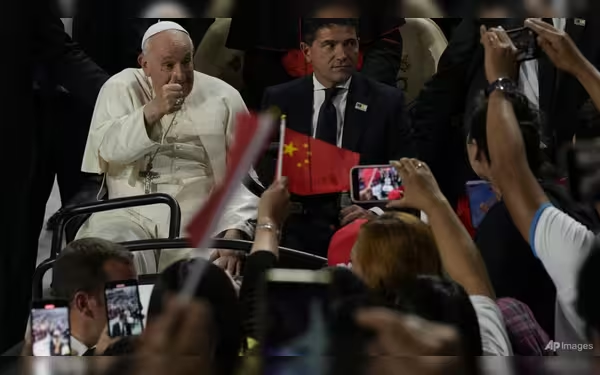Saturday, November 16, 2024 07:42 PM
China-Vatican Pact Renewal: Strategic Diplomacy and Mutual Benefits
- China and Vatican pact renewal expected in October 2023.
- Agreement enhances China's global image and supports Catholic rights.
- Potential challenges for Vatican's ties with Taiwan arise.
 Image Credits: channelnewsasia
Image Credits: channelnewsasiaThe renewal of the China-Vatican pact in October 2023 promises mutual benefits amid evolving international relations.
In 2018, a significant agreement was established between China and the Vatican, marking a pivotal moment in their diplomatic relations. This landmark pact, which focuses on the appointment of bishops, is set to be renewed again in October 2023. Analysts believe that this renewal is almost certain, as both parties have benefited from the arrangement despite some occasional tensions. The agreement has allowed China to enhance its international image while also providing the Vatican with a means to support the rights of Catholics within China.
China has been keen to improve its standing on the global stage, especially in light of increasing geopolitical tensions. The pact with the Vatican has served as a tool for Beijing to counter Western criticism. Former Singapore foreign affairs minister George Yeo emphasized the importance of good relations with the Catholic Church, stating, "You cannot have good relations with Western countries without good relations with the Catholic Church." This highlights the strategic significance of the Vatican in fostering connections with Western nations.
On the domestic front, the agreement has allowed China to maintain greater control over its Catholic community, which numbers in the millions. Experts note that this stability is crucial for the Chinese government, as it seeks to manage religious practices within its borders. The Holy See, in turn, has been able to advocate for the rights of Catholics in China, ensuring that their voices are heard.
However, the warming ties between China and the Vatican may pose challenges for the Holy See's long-standing relationship with Taiwan. Analysts suggest that this could lead to the Vatican reconsidering its formal ties with Taipei. Despite this potential shift, it is expected that the Vatican will continue to maintain some level of representation in Taiwan while simultaneously strengthening its connections with China.
The provisional accord allows for the consecration of bishops with the approval of both Beijing and the Holy See. Greg Burke, the director of the Holy See Press Office, remarked, "This is not the end of a process. It's the beginning." This statement underscores the ongoing nature of the relationship and the potential for further developments in the future.
Since the initial signing of the agreement, there have been notable advancements. For instance, two Chinese bishops participated in the Synod of Bishops assembly, and Hong Kong’s Bishop Stephen Chow was ordained as a cardinal in the Vatican. These events signify a growing collaboration between the two parties, even in the absence of formal diplomatic relations.
China severed ties with the Vatican in 1951, following the rise of the Communist Party, which expelled foreign priests. Since then, the Vatican has maintained official relations with Taiwan, one of the few countries to do so. However, recent gestures, such as Cardinal Chow's invitation to Pope Francis to visit Hong Kong, indicate a desire to bridge the gap between China and the global Catholic community.
As the renewal of the China-Vatican pact approaches, it is clear that both sides have much to gain. The agreement not only serves their respective interests but also reflects a pragmatic approach to diplomacy. With the Vatican's recognition of China's potential role in global peace efforts, particularly in relation to the ongoing conflict in Ukraine, the future of this relationship appears promising.
The renewal of the China-Vatican pact is not just a formality; it represents a significant step in the evolving dynamics of international relations. As both parties navigate their complex histories and current geopolitical landscapes, the implications of this agreement will likely resonate far beyond their borders, influencing the global Catholic community and international diplomacy for years to come.













